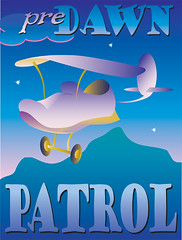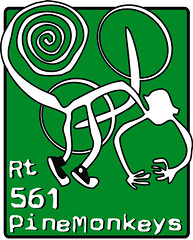You know how people admire and revere writers and the art of writing? So how come the word "writing" is never used adjectively? Like when something beautiful happens to someone, they say it was poetic, or like poetry, or like music. Nobody ever says "I looked at her, she looked at me, and just as a small smile was beginning to touch her lips I leaned in and kissed her - it was like writing."
I have this hill I run every morning. It’s about 300’ high and a mile long. There is a steep right turn at the beginning that is very Daytona-ish (a 45º turn at a 22º) bank. You really have to dig in to get out of the gravity well and up the long grade I like to call “The Daily Grind.” After reaching its summit and continuing along the rolling slight decline another ½-mile behind the high school to the turnaround, I get to push back up over the rise, to bomb my way back down. After a couple twists and turns through the development to bring my mileage to a legitimate 3 for the day; I shed my shoes and socks and walk barefoot through the not-quite-woken up neighborhood.
To push yourself, day in and day out, alone, with no goal, no finish line, no opportunity of recognition or reward except to yourself … is like writing.
"There's that guy running down the hill again. What a sight."
"Like writing in motion."
Some days I do say that to myself:
“Poetry in motion, baby. Poetry in motion”
“More like haiku.”
Writing, I believe is the process; whereas music, poetry, or a story, is the product.
“It was musical …”
“She was poetic …”
“What a novel idea …”
People tend to admire [or critique] the outcome, but ignore the craft, as if it just appeared by magic. And it’s supposed to be easy, for those with the talent; not something that needs to be practiced and refined – maybe on a daily basis.
Let’s see what David Byrne has to say:
[no that's not him; it's Daniel Levitin, a session musician, sound and recording engineer, and record producer. He is now the James McGill professor of behavioral neuroscience and music at McGill University and the author of The New York Times bestseller This Is Your Brain on Music.]
Watch the video by clicking the image below.
Well, I can’t find the quote specifically, but he says something in there about alchemy, how people don’t want to know that a certain piece of music, which inspires them so much, was written during breakfast while thinking about toast.
On a similar theme:
FEAR (And Loathing) OF MUSIC by Tonya Headon [via I Hate Music]
In TV or comic book parlance, “talking heads” refers to that bit where the action stops and the characters stand around explaining things: sometimes a vital part of a narrative’s structure it’s more often the function of a director who has, quite literally, lost the plot. David Byrne, then, might not have been any good at picking suits (he got the collar and chest measurements mixed up, poor thing), but he was a dab hand at choosing names.
Now, I would be the last one to underestimate a listener’s stupidity, but Byrne went a bit far even for me: half of Talking Heads’ songs seem to assume that their audience is Martians. You can try it at home - here’s how to write one:
1) Pick a subject. This should be something very mundane; television perhaps, or animals. Hey! We’ll pick computers.
2) Write about your topic in a simple style. Say nothing that is not obvious. How about - You can type on computers. Your words appear on screen.
3) HERE IS THE IMPORTANT PART. You now have to turn your kindergarten words into a penetrating reflection of the strangeness of modern life. You do this by singing them in a bug-eyed neurotic voice.
3A) If you don’t make the delivery sufficiently nutty you’ll have written a Kraftwerk song instead. And that would never do.
4) Embellish your initial lyrics, if you like, with extra ones of even more staggering obviousness. So your song on computers might now run: “You can type! / On computers. / THEY DON’T TYPE BACK! / Your words show up on the screen / People say the screen is black.”
5) Play weedy approximation of funk/African/Brazilian music behind devastatingly insightful words.
6) Approach bank. Laugh.
David Byrne applied this technique time and again. He considered cities: each had good points and bad points. What of animals? “They say animals are hairy”. Finally his observations reached a stunning peak: on “Once In A Lifetime” (named for how often anyone needs to hear it), he told the world that “There is water at the bottom of the ocean”. In other words, David Byrne made Jonathan Richman look like Hegel.
And people lapped it up. As countless jerky indie-poppers have learned since, if you say anything with a straight enough face people will take it seriously. David Byrne and his band made a pile of albums and one film pointing out to America how secretly weird it was. This is something nobody ever went broke doing: everyone wants to believe the place they live in has a paranoid Lynchian underbelly, it’s far more palatable than the boring reality. Sing that boring reality like a paranoid kook and you’re made, at least until you discover Brazilian music and blow your career out of the water with a series of records which sound like someone’s dad doing the samba.
To sum up …
Getting the idea to move or create is easy. All you need are a pair of sneakers, or a piece of paper and a pencil. Finding the motivation and will to do so is harder; this is the part people don’t see. Once you’re one your way, it’s easy again; this is where the metaphors come in. When you are finished, you want to do it again, as soon as possible.
Right now, for me, every day is a battle between runner’s- /writer’s- and/or artist’s block.
Fortunately, successfully completing that one task every morning inspires me to do another.







1 comment:
Now THAT was like writing. For someone who made a living pretending to make sense out of nonsense, Byrne is wise.
Well done, R.
Post a Comment